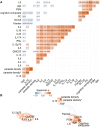Subclinical Inflammation in Asymptomatic Schoolchildren With Plasmodium falciparum Parasitemia Correlates With Impaired Cognition
- PMID: 38512283
- PMCID: PMC11520740
- DOI: 10.1093/jpids/piae025
Subclinical Inflammation in Asymptomatic Schoolchildren With Plasmodium falciparum Parasitemia Correlates With Impaired Cognition
Abstract
Background: Subclinical inflammation and cognitive deficits have been separately associated with asymptomatic Plasmodium falciparum infections in schoolchildren. However, whether parasite-induced inflammation is associated with worse cognition has not been addressed. We conducted a cross-sectional pilot study to better assess the effect of asymptomatic P. falciparum parasitemia and inflammation on cognition in Kenyan schoolchildren.
Methods: We enrolled 240 children aged 7-14 years residing in high malaria transmission in Western Kenya. Children performed five fluid cognition tests from a culturally adapted NIH toolbox and provided blood samples for blood smears and laboratory testing. Parasite densities and plasma concentrations of 14 cytokines were determined by quantitative PCR and multiplex immunoassay, respectively. Linear regression models were used to determine the effects of parasitemia and plasma cytokine concentrations on each of the cognitive scores as well as a composite cognitive score while controlling for age, gender, maternal education, and an interaction between age and P. falciparum infection status.
Results: Plasma concentrations of TNF, IL-6, IL-8, and IL-10 negatively correlated with the composite score and at least one of the individual cognitive tests. Parasite density in parasitemic children negatively correlated with the composite score and measures of cognitive flexibility and attention. In the adjusted model, parasite density and TNF, but not P. falciparum infection status, independently predicted lower cognitive composite scores. By mediation analysis, TNF significantly mediated ~29% of the negative effect of parasitemia on cognition.
Conclusions: Among schoolchildren with PCR-confirmed asymptomatic P. falciparum infections, the negative effect of parasitemia on cognition could be mediated, in part, by subclinical inflammation. Additional studies are needed to validate our findings in settings of lower malaria transmission and address potential confounders that could affect both inflammation and cognitive performance.
Keywords: Plasmodium falciparum; asymptomatic infection; cognition; inflammation; malaria.
© The Author(s) 2024. Published by Oxford University Press on behalf of The Journal of the Pediatric Infectious Diseases Society. All rights reserved. For commercial re-use, please contact reprints@oup.com for reprints and translation rights for reprints. All other permissions can be obtained through our RightsLink service via the Permissions link on the article page on our site—for further information please contact journals.permissions@oup.com.
Figures



References
-
- Walker SP, Wachs TD, Gardner JM, et al.. Child development: risk factors for adverse outcomes in developing countries. Lancet 2007; 369:145–57. - PubMed
-
- World Health Organization. World malaria report 2023. 2023, Geneva: World Health Organization.
MeSH terms
Substances
Grants and funding
LinkOut - more resources
Full Text Sources

